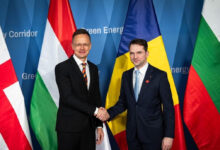Launch of the Romanian Energy Poverty Observatory
The Centre for the Study of Democracy, one of the most important organizations contributing to the study of energy poverty in Romania, has established the Romanian Energy Poverty Observatory, a first such project at national level. The purpose of this initiative is to provide a 360-degree perspective on energy poverty at national level. At the same time, a multidisciplinary working group has been created, consisting of experts, in order to identify the best solutions for combating this complex phenomenon, which affects a large part of the population, especially in the context of the pandemic and the crisis of high energy prices.
Energy poverty is an important challenge at national level, which requires substantial resources to combat it effectively. The current system of helping those in situation of energy poverty, structured mainly through the law on vulnerable consumers, continues to exclude many households in need. In fact, misallocation of aid is one of the main problems of the existing system.
“Through the Romanian Energy Poverty Observatory (REPOV), we bring to the same table leading experts in various relevant areas for the landscape of energy poverty in Romania. Together, we aim to unlock the resources necessary to better understand the fundamental causes of energy poverty at local level, the impact of this phenomenon and the extent in which existing policies can be improved to combat the phenomenon in an effective manner. REPOV promotes solutions based on in-depth analysis, data and a European exchange of ideas,” says Anca Sinea, vice-president of the Association ‘Centre for the Study of Democracy’ and coordinator of this project.
Romanian Energy Poverty Observatory has the following mission:
- Contribute to increasing the capacity of key-institutions of make decisions, through contributions and access to analysis and relevant and up-to-date data on energy poverty.
- Facilitate an informed public dialogue on problems related to energy poverty at national level.
- Support the complete legislative process and draft the implementing rules, while respecting the European commitments on sustainable and just transition.
- Ensure a direct strategic communication with the relevant actors, through a single voice of renowned experts in the field.
Almost one in two Romanians is exposed to the risk of energy poverty
Energy poverty is a phenomenon widely spread in all European countries, but the former communist states are more affected by its manifestations. Moreover, the International week of action against energy poverty takes place in the period February 21-25, 2022, in which experts, policy-makers and practitioners in the field meet to identify practical solutions to alleviate this problem with far-reaching effects on the economic and social condition of those affected.
In Romania, small income, living in inefficient housing and, implicitly, high energy consumption are factors that create a high risk for many families to face energy poverty. Also, rural households are more vulnerable to energy poverty compared to those in the urban environment, due to low income, inappropriate living conditions and reduced access to infrastructure, which creates the context of dependence on wood for ensuring the energy needs in households.
At national level, for 45.3% of the population energy bills are a too big burden in the budget of the own household, paying over 10% of the family budget for them, according to the survey ‘Energy poverty in Romania’s buildings’, conducted by the Centre for the Study of Democracy (2021), which was based on data from the 2018 Family Budget Survey.
This creates a state of energy vulnerability for one in two Romanians, who, to cover all their energy needs, could be forced to reduce their expenditure in other essential chapters for a decent living (medicines, stationery, clothes, other housing equipment, food, or the capacity to save).
It is a fact that, in the current context of the crisis caused by the Covid-19 pandemic and the record energy prices, this phenomenon is accentuated, the update of calculations based on more recent data following to be part of the short-term activities of REPOV.
About the Centre for the Study of Democracy
The Centre for the Study of Democracy (CSD) is a think-thank founded in 2006 within the Department of Political Science, Faculty of Political, Administrative and Communication Sciences, ‘Babes-Bolyai’ University of Cluj, in which it operates as an accredited research centre. The research work carried out so far has given the CSD a voice and a leading position on this topic at both national and European level. CSD experts hold coordinating positions in the European network of expertise on energy poverty COST ENGAGER, coordinates research and expertise projects in multinational consortia, such as the Norwegian project ENCHANT H2020, develops studies underpinning national and European policy initiatives on the subject, are members of the Economic and Social Council and participate in consortia to analyse the European legislative process.






